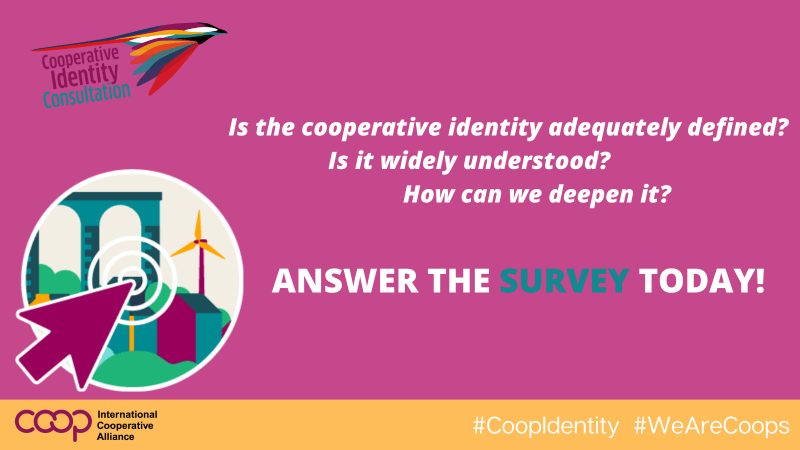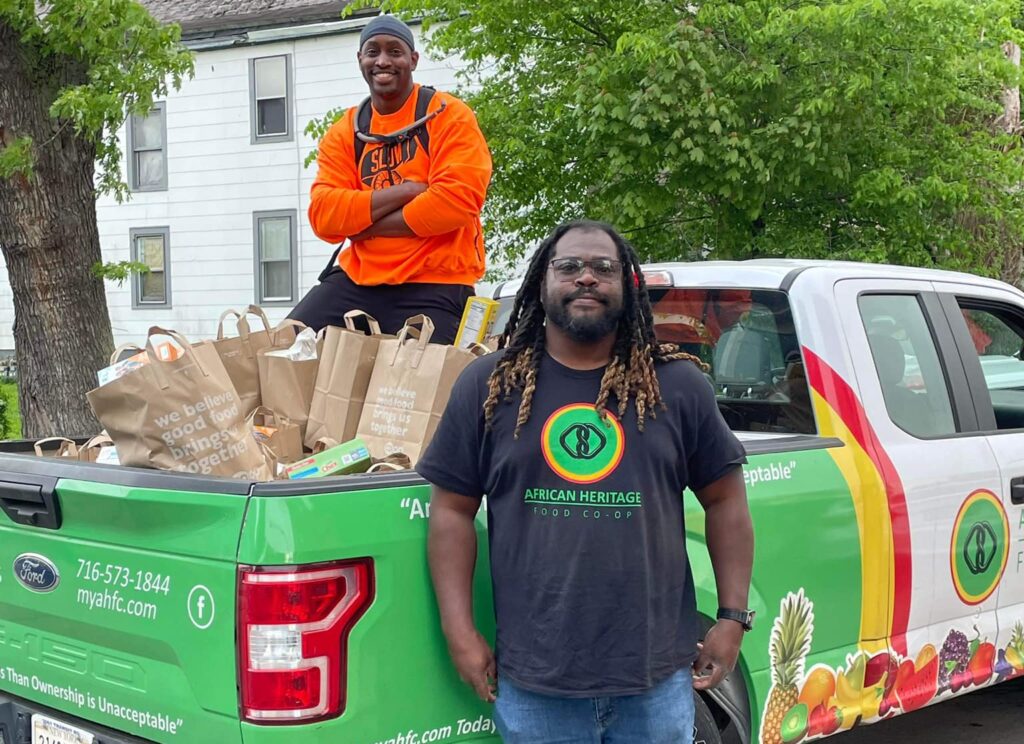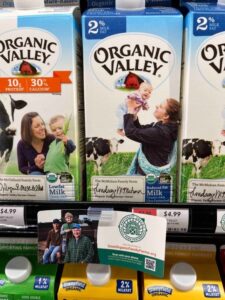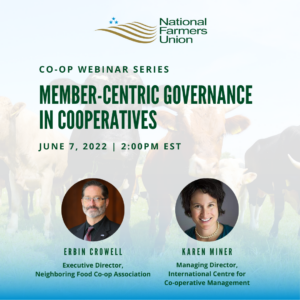Was this newsletter forwarded to you? Subscribe here to keep up to date on NFCA News!
In this edition:
The ICA is looking for your input on Co-operative Identity in their new survey. Image: International Co-operative Alliance
The International Co-operative Alliance (ICA) wants your input on the Co-operative Identity and how co-ops can continue to make a difference for people around the world.
How well is the Co-operative Identity defined? Are our values and principles widely understood? How can we deepen our shared Identity? Co-ops and their members are invited to participate in a short online survey in advance of the ICA General Assembly coming up on June 20 in Seville, Spain, where the Co-operative Identity Advisory Group will be meeting to consider input.
“Our Co-operative Identity has never been more important,” said Erbin Crowell, Executive Director of the Neighboring Food Co-op Association (NFCA) and a member of the Advisory Group. “And this global consultation on our values and principles is a reflection of our movement and its commitment to democracy and participation. I hope that co-ops and their members will take advantage of this opportunity to be part of this historic dialog.”
In 1995, the International Co-operative Alliance (ICA) adopted the Statement on the Co-operative Identity, updating the principles that have guided the co-operative movement for more than 150 years. Subsequently recognized by governments and multilateral organizations around the world, the statement defines the co-operative business model, makes explicit the values on which it is founded, and sets out seven universal operating principles applicable to co-operatives of all kinds. Its existence sets co-operatives apart as the only enterprise model with globally agreed principles that rest on a foundation of shared ethical values.
With the 33rd World Co-operative Congress, held in December 2021 in Seoul, the Republic of Korea, the ICA launched an extensive reflection and consultation intended to deepen our Co-operative Identity and to explore how well the Statement has stood the test of time. Led by a Co-operative Identity Advisory Group made up of people from around the world, the consultation will address such questions as, “Is the Co-operative Identity adequately defined? Is it widely understood? Are co-operatives operating in a manner consistent with it? If not, why not? Are any changes to the formal expression of our Identity required? Can other tools be developed to enhance co-operatives’ understanding of the Co-operative Identity and stimulate action on their part consistent with it?”
Our shared Co-operative Identity is never more important than in times of crisis. The participation of the global co-operative community in this consultation to deepen that Identity is vital. To assist the work of the Advisory Group, co-operatives everywhere in the world, their members and employees, activists and policymakers, and all other persons familiar with co-operatives are invited to complete this short survey.
Food co-ops are invited to respond to the ICA’s survey, and to encourage their individual members to participate as well. For more information, visit https://www.ica.coop/en/consultation-coopidentity.


In response to the racist violence in Buffalo, NY, we join together with support efforts to provide immediate comfort and aid, and to build economic justice and food security moving forward.
Our hearts go out to the community members who have lost loved ones and are hurt and angry in the wake of the recent racist violence in Buffalo, NY. We remain committed to a more just and equitable future, and in solidarity with these communities we are inviting co-operators to learn more about the work taking place in the area to help people heal now, and to build racial justice, economic democracy, and food security moving forward. Some examples include the Buffalo Mutual Aid Network, which is raising funds to provide relief to people impacted by the violence, and the African Heritage Food Co-op, which is accepting donations and distributing groceries to people in need as they advance their vision for creating “a world where inner city ‘neighborhoods’ can become communities. Where no one goes without healthy, affordable food options. Most importantly a world in which we can create ownership and employment opportunities in and for the community.”
Northeast Family Farm Partnership

The Neighboring Food Co-op Association (NFCA) is the first retail organization to join the Northeast Organic Family Farm Partnership’s efforts to support local organic dairy brands and save organic dairy farms in the region.
The Partnership was launched earlier this year through the efforts of Stonyfield Organic co-founder Gary Hirshberg to encourage consumers to increase their weekly purchases of organic dairy brands. The goal is to provide area dairy farms with the demand they need to remain financially viable.
Collectively, the Partnership’s participating brands purchase milk from over 390 farms in the Northeast and their survival is tied to consumer demand.
“Our association and its members are already very focused on supporting our local producers,” says NFCA Executive Director Erbin Crowell. “This Partnership provides an opportunity for us to reinforce our commitment to regional organic farms and dairy brands and to offering healthy, local food to our shoppers and communities.”
As part of their role in the Partnership, NFCA member co-ops across New England and New York State are encouraging customers to consider purchasing one-quarter of their weekly dairy products from participating local organic brands and take a pledge to that effect on the Partnership’s website, at www.saveorganicfamilyfarms.org. More than 2,500 consumers have taken the pledge to date, says Olga Moriarty, Northeast Organic Family Farm Partnership Executive Director.
The NFCA’s 40 member co-ops are locally owned by 168,000 members, offering the general public access to local brands, healthy and organic foods, and other products not often found in supermarkets.
Like those chain stores, food co-ops have faced challenges during the pandemic as they have worked to keep employees and shoppers healthy and safe while supporting local producers, but as Crowell explains, “this Partnership and its effort to help our dairy farmers offers a way for our co-ops to further engage our customers in a positive story, a way for us to work together make a difference.”
Last fall, 135 organic family farms across Maine, New Hampshire, Vermont, and eastern New York received the sudden news that Horizon and Maple Hill Creamery were terminating their purchase contracts, effective in early 2023. This news put these farms, many of whom have been in business for generations, at serious risk of closure unless they find alternate outlets. In early January, the Northeast Organic Family Farm Partnership, a first-of-its-kind campaign in partnership with the Maine Organic Farming and Gardening Association (MOFGA), was created to help solve the crisis of disappearing family farms in our region.
The Partnership, a collaboration of farmers, processors, retailers, activists, and government agencies, invites consumers to pledge to purchase at least one-fourth of their weekly organic dairy purchases from brands that have committed to sourcing their dairy from Northeast organic family farmers. A central goal of the effort is to increase demand for dairy produced in our region, creating market stability to help at-risk farms and build greater food system resilience for the future.
To date, 19 NFCA member food co-ops have signed on to the partnership including:
- Blue Hill Co-op (ME),
- Brattleboro Food Co-op (VT),
- Fiddleheads Food Co-op (CT),
- Franklin Community Co-op (MA),
- Hanover Co-op Food Stores (NH & VT),
- High Falls Food Co-op (NY),
- Hunger Mountain Co-op (VT),
- Leverett Village Co-op (MA),
- Littleton Food Co-op (NH),
- Middlebury Natural Foods Co-op (VT),
- Monadnock Food Co-op (NH),
- Plainfield Food Co-op (VT),
- Portland Food Co-op (ME),
- Putney Food Co-op (VT),
- River Valley Co-op (MA),
- Upper Valley Food Co-op (VT),
- Wild Oats Co-op Market (MA),
- Willimantic Food Co-op (CT), and
- Wolfeboro Food Co-op (NH)
 Take Action: Your food co-op can take action by signing on to the Northeast Organic Family Farm Partnership as a retailer partner and individuals can take action as well by signing the consumer pledge to increase their purchases of regionally-produced organic dairy products. For more information, e-mail Suzette at Suzette@nfca.coop.
Take Action: Your food co-op can take action by signing on to the Northeast Organic Family Farm Partnership as a retailer partner and individuals can take action as well by signing the consumer pledge to increase their purchases of regionally-produced organic dairy products. For more information, e-mail Suzette at Suzette@nfca.coop.

By NFCA Intern Meghna Sarmah
In Northeast U.S., the NFCA is responding to a growing interest in multistakeholder co-operatives.
 Also known as “solidarity” or “hybrid” co-ops, multistakeholder co-operatives welcome a variety of stakeholder groups to become members as consumers, workers, or producers. While not as common in our region, this model is familiar in other parts of the world such as the Canadian Province of Québec, Italy, and the Mondragón Co-operatives in the Basque region of Spain.
Also known as “solidarity” or “hybrid” co-ops, multistakeholder co-operatives welcome a variety of stakeholder groups to become members as consumers, workers, or producers. While not as common in our region, this model is familiar in other parts of the world such as the Canadian Province of Québec, Italy, and the Mondragón Co-operatives in the Basque region of Spain.
With support with the Neighboring Food Co-op Association (NFCA), a federation of more than 40 co-operative grocery stores and startups in New England and New York State, five startup food co-ops have incorporated or plan to incorporate as multistakeholder food co-ops: Charles River Food Co-op (MA), Common Share Food Co-op (MA), Dorchester Food Co-op (MA), Kingston Food Co-op (NY), and North End Co-operative Market (CT).
To help support these startup multi-stakeholder co-ops through the Neighboring Food Co-op Association, I did an internship with the UMASS Amherst Department of Economics as part of the Certificate in Applied Research on Co-operative Enterprise. A focus was to help set up a roadmap for multi-stakeholder co-ops preparing to open their doors, exploring best practices to engage both groups of these co-ops’ stakeholders (consumers and workers) in their roles, purpose, and co-operative education.
On April 25, 2022, I hosted a panel organized by the Neighboring Food Co-op Association (NFCA) and supported by the Valley Alliance of Worker Co-operatives (VAWC), with 16 participants attending. The event was organized to provide startups with more information on the model, offer an opportunity to share ideas, and to ask questions that would assist them in operating their co-operatives. Presenters included NFCA executive director Erbin Crowell, VAWC executive director Adam Trott, and Larisa Demos, a founding member of Flat Iron Co-op, a worker/consumer co-op café that opened recently in Bellow’s Falls, VT, with support from VAWC and the NFCA.
A focus of the panel was the importance of education and training, particularly for co-ops with more complex membership structures. It is important for startups to continually educate their members, not just about the business they are operating together, but about the co-operative model itself. The International Centre for Co-operative Management at Saint Mary’s University was highly recommended for co-op education as they offer a variety for programs including a masters in co-operative management, as well as a certificate, diploma, and executive education courses.
The Co-operative Identity was also woven throughout the discussion. Co-operatively-owned businesses are not intended to be a profit-maximizing ventures; rather they are designed to operate at-cost in the service of their members with net income reinvested in the enterprise or distributed among members in proportion to their use of the business. Panelists pointed out that these “patronage refunds” are not synonymous with profit or a return on investment, which is an important part of education on the co-operative model.
During my last semester at UMass Amherst, I learned much more about co-operative enterprise. I was introduced to the concept of multistakeholder co-ops, a form of co-op that I was unaware of before this internship. I learned much more about how these businesses function with multiple class memberships, balancing the interests of these different member classes and engaging them in shared success. I also drafted some best practices and recommendations from my research to help the NFCA members who are organizing in this way. I also hope to bring what I’ve learned about co-ops to my graduate program.
Meghna Sarmah is a senior at UMASS Amherst, majoring in economics. Her internship is part of her completion of the Certificate in Applied Research in Co-operative Enterprise with the UMASS Amherst Department of Economics. She hopes to apply knowledge learned in this program to future projects at her graduate program for applied economics.
 Co-op City in the Bronx, New York, NY.
Co-op City in the Bronx, New York, NY.
The Affordable CO-OP Act would expand opportunities for co-operative housing, building greater security for people across the country.
Co-op City, NY – On May 9, Congressman Jamaal Bowman, Ed.D. (NY-16) hosted residents in Co-op City, housing advocates, local elected officials and community leaders to announce his Affordable CO-OP (Collective Opportunities for Owning Property) Act.
“My American dream is to live in a country where everyone has access to dignified housing,” said Congressman Jamaal Bowman, Ed.D (NY-16). “As housing prices and the cost of living reach an all-time high and wealth inequality grows, more and more people are being shut out of the opportunity to stay stably housed or become homeowners due to high prices, wealth disparities, and corporate greed in the real estate sector. From redlining and exclusionary zoning to credit and lending discrimination, our nation continues to face an urgent, racially unjust housing crisis that disproportionately harms Black, brown, low-income, and elderly people.
“My bill, the Affordable CO-OP (Collective Opportunities for Owning Property) Act, would expand federal support for affordable housing co-operatives to make homeownership more accessible for people who have been historically exploited by a real estate industry prioritizing profits over people. Limited equity co-operative housing is a type of affordable housing that allows residents to communally own their own property, have a stake in decision-making, and sell units at a price that maintains affordability for future residents. This bill would unlock more federal funds to develop and convert properties into limited equity co-operatives and ensure that co-operative residents have access to funds for resilience improvements, community programming, and other support they need to thrive.”
“In my district, Co-op City is a prime example of how shared equity housing can foster community and long-term affordability for all. Co-op City is the largest housing co-operative in the world and the largest Naturally Occurring Retirement Community in the nation, with over 45,000 residents. Here, neighbors enjoy their own homes with affordable mortgage payments, can age in place and build lasting relationships with their neighbors over generations. If we center people in our housing policy, housing justice can finally become a reality for all.”
Specifically, the Affordable Co-op Act will:
- Equip HUD to issue zero-interest loans for the predevelopment, development, preservation, and conversion of properties into limited equity co-operatives for low-to-moderate income households.
- Create a new grant program for limited equity co-operatives for green retrofits, community development, democratic governance activities, and resident support programming.
- Revise FEMA and Weatherization Assistance Program policies to ensure co-operatives can access disaster relief funding and weatherization funds.
- Establish an Office of Shared Equity Housing at HUD to support affordable co-operatives and provide technical assistance to tenants, non-profits, and cities looking to support co-operative housing models
“Given our current housing crisis, it’s crucial we support access to affordable housing opportunities now more than ever,” said Senator Chuck Schumer (D-NY). “Co-ops have always been essential to expanding access to affordable housing for working families in New York. I was proud to work with Representative Bowman to secure a long-term $621 million loan for Co-op City to make critical capital repairs. We need to do all we can to continue to expand federal support for affordable housing co-operatives in New York, as proposed by the Affordable CO-OP (Collective Opportunities for Owning Property) Act of 2022, to support not only Co-op City and its residents, but all co-op housing across the state and country.”
“I am proud to support the Affordable CO-OP (Collective Opportunities for Owning Property) Act of 2022 presented by our Congressman Jamaal Bowman,” said Sonia Feliciano, 1st Vice President of the Riverbay Board. “It recognizes Co-op City as a national model and treasures preserving affordability for years to come.”
“Limited Equity Co-operative housing like Co-op City and the 1,200+ HDFC Co-ops in NYC have been extraordinarily successful in providing permanently affordable homeownership opportunities for New Yorkers for nearly 100 years, said Andrew Reicher, Executive Director of UHAB. “The Affordable CO-OP Act will not only expand this much needed housing opportunity in NYC but make this successful model available nation-wide.”
“The National Association of Housing Co-operatives represents thousands of housing co-operative units nationwide and has done so for the past sixty-one years. We strongly support the Affordable CO-OP Act, which focuses on government funding for the development and preservation of limited equity co-operatives in the U.S.,” said Fred Gibbs, President of the National Association of Housing Co-operatives (NAHC). “This legislation aligns with our mission, “To support and educate existing and new co-operative housing communities as the best and most economical form of home ownership.”
 TAKE ACTION: Write to your Congressional Representatives and encourage them to cosponsor H.R. 7697, “The Affordable CO-OP (Collective Opportunities for Owning Property) Act. Let them know how your food co-op helps build food security and more vibrant local communities — and how this act would help families build greater security through housing co-ops!
TAKE ACTION: Write to your Congressional Representatives and encourage them to cosponsor H.R. 7697, “The Affordable CO-OP (Collective Opportunities for Owning Property) Act. Let them know how your food co-op helps build food security and more vibrant local communities — and how this act would help families build greater security through housing co-ops!
Member-Centric Governance in Co-operatives
Join us on Tuesday, June 7 at 2:00 pm ET for the next installment of National Farmers Union’s co-op webinar series.
 The ultimate aim of co-operative governance is to fulfill the organization’s goals in a way that is consistent with its core purpose, aligned with the Co-operative Principles, and supportive of success in the long-term. The most appropriate and effective models are member-centric, embrace joint ownership and control, and support democratic decision-making that will guide the activities of the enterprise. This presentation will outline effective governance characteristics and provide examples of structures and processes for success
The ultimate aim of co-operative governance is to fulfill the organization’s goals in a way that is consistent with its core purpose, aligned with the Co-operative Principles, and supportive of success in the long-term. The most appropriate and effective models are member-centric, embrace joint ownership and control, and support democratic decision-making that will guide the activities of the enterprise. This presentation will outline effective governance characteristics and provide examples of structures and processes for success
Click below to learn more and register for this webinar!
Register Here
(Can’t attend live? Register to receive a link to the recording.)
This webinar and NFU’s co-op series will be hosted by Erbin Crowell, New England Farmers Union Board Member and Executive Director of the Neighboring Food Co-op Association, and special guest Karen Miner, Managing Director of the International Centre for Co-operative Management at Saint Mary’s University.
To view past co-op webinars, please visit the NFU YouTube channel.

West River Creamery is nestled between three mountains in Londonderry, VT. The owners and cheesemakers Charlie and Jane Parant have always been involved in agriculture and have been making cheese since the 1980’s. Originally making cheese at Middletown Farm and buying sheep milk from a New York sheep co-op, Charlie and Jane like so many had to pivot to making cheese at a different dairy after the farm changed hands.
Charlie and Jane make fresh goat cheese and feta two days a week, using milk from neighboring farms. Using a traditional feta recipe, the cheese is brined for several months before being packaged in marinade for sale. West River Marinated Feta is made from pasteurized cow’s milk; marinated in grape seed oil, sun dried tomatoes, garlic, and herbs. The perfect feta for summer salads.
Our Cave to Co-op partnership between Provisions International and the Neighboring Food Co-op Association offers a regionally produced cheese featured at a great price. Strengthening our local and regional farmers and producers by supporting artisanal cheesemakers is a key goal of the Cave to Co-op program.
Each month we have recipes and background information available on our website. Check out this recipe excellent for summer gatherings using this month’s featured Cave to Co-op cheese.
- 6 ounces feta
- 1/2 cup finely chopped fresh flat-leaf parsley
- 1/4 cup finely chopped fresh mint
- 2 tablespoons finely chopped fresh dill, plus torn sprigs for serving
- Kosher salt and freshly ground black pepper
- 1-3 tbsp Olive oil
- Combine all of the ingredients in a food processor
- Blend until smooth and creamy, adding olive oil until the desired texture is achieved.
- Put in a bowl and garnish with a grind of peppers and sprig of dill. Serve with bread, pita, crackers, or fresh veggies.
For more information on Cave to Co-op, visit https://nfca.coop/cavetoco-op/.
Farmers Union applauds introduction of legislation supporting enforcement of competition laws and investigation of abusive market practices.
 On May 18, House Agriculture Committee approved H.R. 7606, the Meat and Poultry Special Investigator Act of 2022. The bill would increase enforcement of competition laws and boost USDA’s resources to investigate abusive market practices.
On May 18, House Agriculture Committee approved H.R. 7606, the Meat and Poultry Special Investigator Act of 2022. The bill would increase enforcement of competition laws and boost USDA’s resources to investigate abusive market practices.
“Passage of this bill is a priority for National Farmers Union (NFU) and our ‘Fairness for Farmers’ campaign,” said NFU President Rob Larew. “Laws intended to protect markets from monopolies and anti-competitive practices in agriculture are not being adequately enforced. Greater enforcement of competition laws by USDA will better ensure America’s independent family farmers and ranchers have a chance to succeed in today’s marketplace, now dominated by monopolies,” added Larew. “While there are many more measures needed to ensure a fair marketplace, the action during this week’s House Agriculture Committee markup is a big step forward.”
“I would like to thank Chairman David Scott for his leadership and the House cosponsors of the bill, in particular Rep. Abigail Spanberger of Virginia, for their outspoken advocacy on behalf of family farmers and ranchers,” said Larew. “NFU members traveled to Washington, D.C. in late April to advocate for this and other priorities, and it is especially encouraging to see the bill make its way further through the legislative process.”
NFU’s “Fairness for Farmers” campaign has brought the devastating impact of monopolies on family agriculture into the national spotlight. Campaign priorities include addressing issues such as increased enforcement of competition laws that can combat excessive costs for fertilizer, supply chain vulnerabilities, and increased farm equipment costs.
Among other actions taken by the House Agriculture Committee was the approval of H.R. 7675, which would establish an Agricultural and Food System Supply Chain Resilience and Crisis Response Task Force. The bill is cosponsored by Reps. Angie Craig of Minnesota, Dusty Johnson of South Dakota, Cheri Bustos of Illinois, Ashley Hinson of Iowa, Cynthia Axne of Iowa, and Randy Feenstra of Iowa.
“Family farmers and ranchers know the importance of having a resilient food supply chain, and this bill will help to make sure that we can overcome the weaknesses of the current system,” said Larew. “The task force will help identify answers so that we’re better prepared for future challenges and a stronger system in general.”
Our Local Farmers Need You!
 National Farmers Union advocates on behalf of nearly 200,000 American farm families and their communities. We envision a world in which farm families and their communities are respected, valued, and enjoy economic prosperity and social justice. Farmers are invited to join the New England Farmers Union chapter – and consumers can join as a “Friend of the Farmer” for just $15. For more information, please visit www.newenglandfarmersunion.org.
National Farmers Union advocates on behalf of nearly 200,000 American farm families and their communities. We envision a world in which farm families and their communities are respected, valued, and enjoy economic prosperity and social justice. Farmers are invited to join the New England Farmers Union chapter – and consumers can join as a “Friend of the Farmer” for just $15. For more information, please visit www.newenglandfarmersunion.org.
Join food co-op leaders from across the country for CCMA, an in-person or virtual conference, June 9-11, 2022, including engaging keynotes, breakout sessions tackling issues impacting food co–operatives, and networking opportunities for those committed to creating more inclusive and sustainable co–ops and communities. Co-Sponsored by the Neighboring Food Co-op Association (NFCA).







